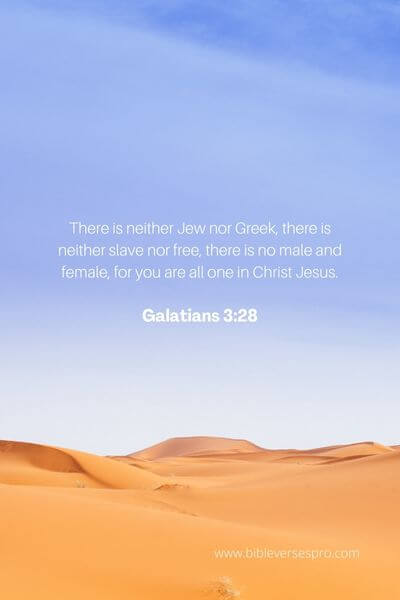The Bible speaks of treating everyone equally. It’s one of those things that we should do because it’s the right thing to do. However, we often find ourselves in situations where people are being treated badly, so we forget about God’s instruction. But we don’t have to live like this. Let me show you 23 important Bible verses about treating everyone equally.
Bible verses about treating everyone equally
Bible verses about treating everyone equally are described in the Bible over 60 times. These are just a few of the hundreds of Bible verses about treating everyone equally. They can be hard to find if you’re not looking for them. Here is where to look:
James 2:5 – Take everyone as your brother and sister.
Listen, my beloved brothers, has not God chosen those who are poor in the world to be rich in faith and heirs of the kingdom, which he has promised to those who love him?
James 2:5 (ESV)

In this Bible verse, James makes us understand that although we are poor, we should not be envious of the rich people among us.
And those who are rich, should not look down on the poor or treat them like trash like most unbelievers usually do. But we should take everyone as our brother and sister in faith.
Galatians 3:28 – We are all one.
There is neither Jew nor Greek, there is neither slave nor free, there is no male and female, for you are all one in Christ Jesus.
Galatians 3:28 (ESV)

This Bible verse makes us understand that in the body of Christ, we are all one. There is no Jew nor Greek, and there is no slave or freeborn.
This is what is expected of us in our relationship with others. We should treat everyone as one, and not despise others because, in Christ, we are all equal.
James 2:2-13 – God did not intend for us to be divided.
For if a man wearing a gold ring and fine clothing comes into your assembly, and a poor man in shabby clothing also comes in, and if you pay attention to the one who wears the fine clothing and say, “You sit here in a good place,” while you say to the poor man, “You stand over there,” or, “Sit down at my feet,” have you not then made distinctions among yourselves and become judges with evil thoughts?….
James 2:2-13 (ESV)

James in this Bible verse talks about the differences often seen in the church between the rich and the poor. Most times the rich tend to be given a special sit.
But we are made to understand that all these are not good. We are all equal in God’s presence, so we should not divide the church because of earthly riches.
Romans 2:11 – God is dependable, just, and impartial to all.
For God shows no partiality.
Romans 2:11 (ESV)

Paul makes it plain that people who act partially and submit to injustice will face an inevitable judgment.
Such people live lives marked by conflict with God, dissension with God, disobedience towards God, and doubting the veracity of God’s Word. They have rejected God’s free gift of salvation through faith.
The Bible is simple to comprehend. It is constant and unchanging, and God is dependable, just, and impartial to all.
Every man will be judged according to his deeds, and God will reward each individual in accordance with their deeds, according to what He has stated in His Word. God does not favor one over another, and everyone is assessed using the same standards.
Philippians 2:3 – Abstain from dishonesty.
Do nothing from rivalry or conceit, but in humility count others more significant than yourselves.
Philippians 2:3 (ESV)

Paul exhorts his readers to abstain from being avaricious or dishonest. His intention was to shift attention from himself to others.
Love and unity are not our genuine ideals when partiality influences our decisions.
Instead, Paul advocated for seeing others as superior to ourselves and treating their needs as being more essential than our own.
Believers cultivate the kind of humility that leads to comradery and unity by prioritizing the needs of others. The focus was on others rather than on oneself.
Matthew 7:12 – The foundation of our faith.
“So whatever you wish that others would do to you, do also to them, for this is the Law and the Prophets.
Matthew 7:12 (ESV)

Both believers and non-believers frequently refer to this text as “the golden rule.” It is frequently thought of as the foundation of our Christian faith.
This golden rule is the unique foundation upon which the Christian life is constructed, including the entirety of God’s Word.
However, this verse is undoubtedly a guiding principle for Christians, and it should influence our attitudes, motives, and both visible and invisible actions.
It should be a life principle that impacts every area of life, and it should be exercised on everyone with whom we come into contact.
However, when it is regarded as the sum total of biblical truth, as is evident in many parts of Christendom today, it is to water down the full counsel of God, to avoid the cross of Christ.
Proverbs 11:1 – So, in whatever we do, we must be truthful with people.
A false balance is an abomination to the Lord, but a just weight is his delight.
Proverbs 11:1 (ESV)

God strongly disapproves of dishonest business practices and is in favor of people who are honest in their occupations and not partial.
We are made to understand that a false balance is an abomination to the LORD, But a just weight is His delight.
So, in whatever we do, we must be truthful with people.
John 13:16 – An example from Jesus.
Truly, truly, I say to you, a servant is not greater than his master, nor is a messenger greater than the one who sent him.
John 13:16 (ESV)

The immediate response of Peter to Jesus washing the disciples’ feet demonstrates how revolutionary the deed was.
In the framework of that culture, Peter believed Jesus was renouncing His position as Lord and assuming the status of a servant in order to wash his followers’ feet.
Jesus had set an example for the apostles. How much more should they, his servants, humble themselves in serving one another if he, their teacher and Lord, did so by washing their feet?
Matthew 19:26 – With God, all things are possible.
But Jesus looked at them and said, “With man this is impossible, but with God all things are possible.”
Matthew 19:26 (ESV)

The disciples questioned, “Who then can be saved?” after Jesus had spoken to a wealthy young man about how his money was a barrier to entering the kingdom of heaven.
The young guy had accepted Jesus’ challenge to sell everything he owned and donate the earnings to the needy.
He left with a heavy heart because of his love of money, despite having many valuable belongings.
At that point, the Lord turned to face His followers and stated, “With people this is impossible, but with God, all things are possible,” looking at them carefully. It is impossible for a man to be saved, but with God, everything is possible, even the rescue of sinners.
James 2:8-9 – Treat each other equally.
If you really fulfill the royal law according to the Scripture, “You shall love your neighbor as yourself,” you are doing well. But if you show partiality, you are committing sin and are convicted by the law as transgressors.
James 2:8-9 (ESV)

James argued that it is doubly unwise to favor the wealthy over the poor. Because it denies the equality of all men and the reality of our genuine destiny in heaven, it is sinful.
When it is the rich who are oppressing the poor, it is absurd to discriminate against them and support the wealthy.
Favoritism, according to James, is against this unambiguous and important command from God.
According to James’s message, treating our neighbors the way we want to be treated implies loving them as we love ourselves.
As we would any wealthy person who would attend our events, we will treat our poor Christian brothers and sisters with the same decency and respect.
Bible verses about treating each other equally
Acts 10:34
So Peter opened his mouth and said: “Truly I understand that God shows no partiality,
Acts 10:34 (ESV)
When Peter shared the gospel with Roman believers, he had to put aside his earlier prejudice against the despised gentiles.
It took Peter and the early Jewish church a long time to understand that God is not partial.
When the Holy Spirit powerfully descended upon everyone who was listening to the Good News of Salvation at Cornelius’ home, Peter was able to speak up with assurance and conviction, “I most certainly understand now that God is not One to show partiality.”
John 15:12
“This is my commandment, that you love one another as I have loved you.
John 15:12 (ESV)
Jesus explained how action denotes a relationship with Him by using the image of a vine and its branches.
In that conversation, Jesus reaffirmed that individuals who genuinely believe are obliged to live according to His teachings.
Jesus gave several commands, but one of the most important is that we love one another without being partial.
It is difficult for us to follow Christ’s admonition to love one another as He loved us faultlessly.
Micah 6:8
He has told you, O man, what is good; and what does the Lord require of you but to do justice, and to love kindness, and to walk humbly with your God?
Micah 6:8 (ESV)
Since only those who are born from above have been gifted with the new life in Christ, the godly nature of Christ Jesus, only those who have trusted Christ as Saviour are able to act justly, be kind, and walk humbly before their God.
Only Christians have His righteousness imputed to them, and only they are able to behave justly, love faithfulness, and walk humbly before God.
Philippians 2:4
Let each of you look not only to his own interests, but also to the interests of others.
Philippians 2:4 (ESV)
Paul understood that being kind and compassionate to one another, having the love of Christ in their hearts, being one in spirit, and having a common purpose are some of the factors that lead to Christian joy and walking in fellowship with the Lord.
We are all obligated to put the needs of others ahead of our own because he understood that doing so will help us to keep our joy in the Lord.
He also realized that doing so will help our brothers and sisters in Christ.
Ephesians 5:21
Submitting to one another out of reverence for Christ.
Ephesians 5:21 (ESV)
Paul describes the characteristics of a person who walks as a child of light and is filled with the Spirit of God in his epistle to the Ephesians.
Because living a life of godly self-sacrifice and walking in spirit and truth and being filled with the Holy Spirit brings forth an abundance of spiritual fruit that is produced for the good of others and the glory of God.
A spirit-filled Christian, according to Paul, talks to their fellow Christ-followers in psalms, hymns, and spiritual songs, displaying a life that rejoices in the truth and grows as a result of sharing stories of God’s mercy and grace with other members of the body of Christ.
Ephesians 4:32
Be kind to one another, tenderhearted, forgiving one another, as God in Christ forgave you.
Ephesians 4:32 (ESV)
Our call to kindness, compassion, and forgiveness rests on the immeasurable forgiveness and mercy that each of us has received in Christ Jesus.
As such, forgiveness should be a topic to which we pay close attention. Forgiveness is one of the godly garments with which we have been covered and clothed.
We should strive to be people who are quick to ask for forgiveness and quick to forgive in order to honor our loving Lord and Savior, Jesus Christ.
Ephesians 4:30
And do not grieve the Holy Spirit of God, by whom you were sealed for the day of redemption. Let all bitterness and wrath and anger and clamor and slander be put away from you, along with all malice. Be kind to one another, tenderhearted, forgiving one another, as God in Christ forgave you.
Ephesians 4:30-32 (ESV)
Early on in Ephesians, Paul informs us that when we first believe, we are sealed with the Holy Spirit of promise.
He then builds on this principle by saying that we will remain sealed until the day of redemption.
Never let us question the assurance of our salvation because the Holy Spirit of God has sealed us until the day of our redemption.
Acts 10:34-35
So Peter opened his mouth and said: “Truly I understand that God shows no partiality, but in every nation anyone who fears him and does what is right is acceptable to him.
Acts 10:34-35 (ESV)
The early church would also have to learn the astounding truth that all believers in Christ would be baptized into the Body of Christ at salvation by the permanently indwelling Holy Spirit, as well as the previously unrealized fact that Gentile believers in Christ were equally accepted by God as Jewish believers in Christ.
The first step towards a deeper understanding that there is neither Jew nor Gentile, male nor female, bond nor free, old nor young, black nor white but that we are all one in Christ and accepted in the Beloved lest anyone should boast was that Gentiles were also given the indwelling Holy Spirit by faith in Christ.
FAQ
What does the Bible say about treating other equally?
The Bible is clear in its command to treat others equally. In the book of Leviticus, Moses says that God is “just and upright” and that “it is not good for a man to be alone” (Leviticus 20:13). Thus, a person must not be unequally yoked together with a woman.
The Bible also calls for treating others with respect and dignity (1 Peter 3:7). In the book of Proverbs, Solomon writes, “A wise son heeds his father’s instruction; but a scorner does not listen to rebuke” (Proverbs 13:1).
What does the Bible say about loving everyone equally?
The Bible teaches that we should love everyone equally. The key word here is “love.” It does not say “treat everyone the same,” or “treat everyone equally.” It says “love.”
The Bible also teaches that if you want to know God, look in his heart, and find the place where he shows his love for others. This is what Jesus did when he gave his life for us, so that we will have eternal life with him in heaven.
We are told that we should love our enemies and do good to those who hate us (Matthew 5:44). We are also told to show mercy and compassion to those who need it (Luke 6:35).
What does the Bible say about human equality?
The Bible does not teach human equality. In fact, it teaches that God has made some people superior to others in certain ways.
The Bible makes clear that God has made men and women different:
Genesis 1:27-28
“So God created man in his own image, in the image of God he created him; male and female he created them.”
Genesis 9:6
“Whoever sheds the blood of man, by man shall his blood be shed.”
(This refers to capital punishment.)
These passages are clear that there are important differences between men and women. They do not mean that all people are equal; they simply mean that God has given one group particular gifts and responsibilities over another group.




![How To Open A Church Service [Step By Step Guide] How to open a church service [Step by Step Guide]](https://www.bibleversespro.com/wp-content/uploads/2022/12/How-to-open-a-church-service-Step-by-Step-Guide.jpg)


